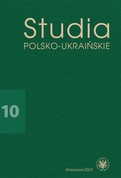Латинська мова в інтелектуальному житті європейців ХХ–ХХІ ст.
The Role of Latin in the Intellectual Life of Europeans in the Twentieth–Twenty-First Centuries
Author(s): Lyudmyla Shevchenko-SavchynskaSubject(s): German Literature, Theory of Literature, Russian Aggression against Ukraine
Published by: Wydział Lingwistyki Stosowanej Uniwersytetu Warszawskiego
Keywords: Neo-Latin studies; Latin language; 21st century; Anne-Ilse Radke; Herman Weller; Russian-Ukrainian War;
Summary/Abstract: In the twentieth–twenty-first centuries, Latin is used as the language of European culture, and not only in certain areas of intellectual life. Many scientific journals publish the main text of articles in national languages, accompany them with a Latin abstract, or find a place for Latin poems, humorous stories, crosswords, etc. Some journals were printed entirely in Latin e.g., Latinitas (Vatican), Palaestra Latina (Barcelona), Vox Latina (Saarbrucken), Vita Latina (Avignon), Orbis Latinus (Mendoza), Melissa (Brussels), etc. In the mid-twentieth century, a series of collections of Neo-Latin poetry written by individual authors (Hermann Weller [Tübingen, 1946], Hugo Enrico Paoli [Florence, 1961]), or multinational anthologies were published. Works inspired by dramatic events of history and social and political life of the twentieth–twenty-first centuries stand out among the galaxy of modern neo-Latinists: Hermann Weller’s elegy Y (Tübingen, 1937) – is a profoundly allegorical work, a vivid testimony of internal emigration; a collection of neo-Latin poems “Laudes Ukrainae” (“Praise to Ukraine”) by Anna Eliza Radke. “Laudes Ukrainae” includes more than 50 poems in which the poetess’s civic position and attitude to the Russian-Ukrainian war are directly and unequivocally stated. Most of the poems have six language versions: Latin, Ukrainian, Spanish, German, Polish, and French.
Journal: Studia Polsko-Ukraińskie
- Issue Year: 2023
- Issue No: 10
- Page Range: 105-118
- Page Count: 14
- Language: Ukrainian

